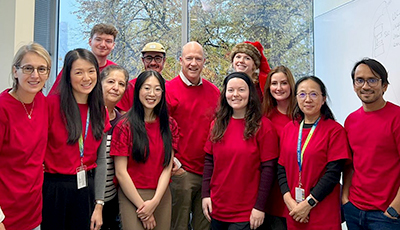
A growing body of evidence shows that the granzyme family of enzymes offer new pathways to target for the treatment of many chronic inflammatory conditions.
They can cleave apart tissue structures and promote inflammation. Now, research is uncovering the link between granzyme serine proteases and diseases ranging from cardiovascular ailments to asthma, autoimmune conditions, arthritis and skin problems.
A pioneer of granzyme research, Vancouver Coastal Health Research Institute researcher Dr. David Granville has spent almost two decades understanding the link between granzymes and our health, which he shares in a recently published review in the high-impact journal, Nature Reviews Rheumatology.
“We are now in the process of developing medications that target specific granzymes for the treatment of autoimmune and age-related pathologies,” states Granville.
“We have only just begun to scratch the surface in understanding how these destructive enzymes impact disease.”
Granzymes can accumulate in human tissues, with autoimmune diseases and over time due to chronic exposure to environmental factors, such as cigarette smoke, air pollution, sunlight and diet, playing a role in promoting their accumulation.

Granzymes perform a key role in immune function, aiding in the destruction of unwanted, infected or abnormally replicating, growing cells. There are five granzymes in humans: GzmA, GzmB, GzmH, GzmK and GzmM, with GzmB receiving the majority of attention in publications to-date, in part due to Granville’s GzmB research findings. In recent years, there has been a shift to recognizing a key role for these enzymes as they leak out of immune cells, accumulate in tissues and degrade key proteins that maintain tissue structure and function. These enzymes also impede the ability for tissues to heal normally.
This latest review, first-authored by post-doctoral fellow, Dr. Alex Aubert, highlights a growing body of evidence implying a role for granzymes in rheumatic diseases, notably rheumatoid arthritis, lupus, Sjogren syndrome, systemic sclerosis and other conditions. Next steps for the Granville lab will be to unravel how granzymes are contributing to these diseases.
Granville was among the first to link granzymes to aging effects in skin, which subsequently led to ground breaking discoveries surrounding the role of GzmB in eczema, scarring, fibrosis and other conditions, as well as in preventing wound healing in diabetic wounds and bed sores.
“Like molecular ‘Pac-Men,’ granzymes eat away at very specific proteins causing injury and inflammation while preventing the ability of tissues to heal.”
Depending on the type and where the enzymes accumulate within the tissue, granzymes may contribute to accelerated aging, impaired healing or blistering.
In another manuscript published in Nature Communications, Granville’s research identified how GzmB promotes autoimmune blistering conditions that largely affect older adults. Using three different models and a drug they developed, Granville and his team were able to prevent the blistering from occurring in pre-clinical studies.

Granville and his team also discovered a connection between GzmB and aortic aneurysm. The aorta is the largest artery in the body, carrying blood from the heart through the chest and torso. Aortic aneurysms usually occur in men with a history of smoking over the age of 65 and result as a consequence of vessel wall expansion, forming a bulge that can burst, leading to blood loss and death. Granville found that GzmB accumulation in the aorta contributes to the weakening of the artery wall leading to ballooning of the vessel and rupture.
“Similar to skin, GzmB also contributes to blood vessel aging,” says Granville. “With respect to aortic aneurysm, GzmB inhibition increased circumferential tensile strength of the vessel, prevented rupture and increased survival in experimental models.”
Granzyme research is generating new pharmaceutical possibilities
New research into granzymes is looking into their impact on the epithelium — the layer of skin that covers the body, and makes up glands in the body, as well as lines body cavities and hollow organs. Findings show that granzymes are able to disrupt the protective barrier function of the epithelium and inhibit its ability to prevent the crossing of pathogens and other foreign materials, leading to infection and inflammation.

Epithelial disruption caused by granzymes may provoke asthma symptoms and contribute to inflammation, tissue frailty, Crohn’s disease, gum disease and age-related cardiovascular and pulmonary diseases, as well as macular degeneration — a primary cause of blindness in older adults.
“More recently, we discovered a novel role for other granzymes in autoimmune diseases, such as arthritis and psoriasis,” Granville adds.
Granville’s lab is currently working to translate their research findings into the clinic. Discoveries stemming from the lab have led to the formation of a UBC spinoff company called viDA Therapeutics.
“Our goal remains to define and validate these targets as we design novel therapeutics for autoimmune and age-related diseases,” says Granville.


